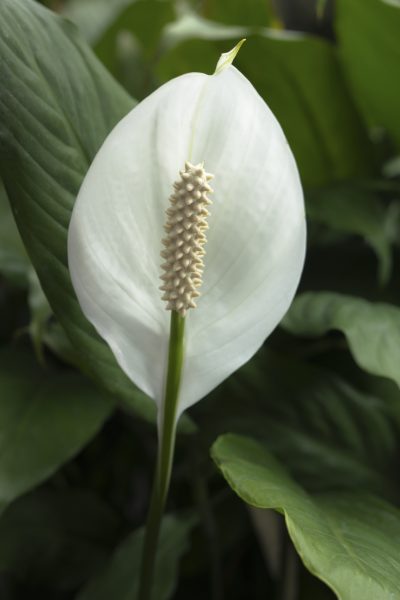






If you work in an office space or lack a window in your room at home, chances are your only light is the overhead fluorescent bulbs or incandescent lighting. Lack of windows and exposure to sunlight can be bad for humans as well as plants but finding plants to brighten your cubicle or windowless room may be just the touch of outdoors needed to perk you up. There are many plants for windowless rooms that will thrive in artificial light. Let’s take a look at a few good options.
Plants need sunlight to photosynthesize, produce flowers and fruit and for overall health. That being said, plants are also uniquely adaptable and many vigorous specimens are perfect windowless houseplants. Choose a tried and true indoor specimen that will green up your space, clean your air and lend an aura of nature to any sterile indoor setting.
You don’t have to work in a warehouse or deep inside a skyscraper to experience low light indoor conditions. And many homes have lighting issues due to the placement of the rooms or shading from trees outside.
Windowless houseplants are suitable for fully shaded or semi-shady areas. When choosing plants, consider the size before purchasing. For instance, a dracaena can get quite tall as can parlor palms.
Growth rate is another factor to consider. If you want a good sized plant, pick one with a rapid growth rate that will fill your area with greenery. Vining plants usually work well. If you want a hanging or trailing plant, try a heart-leaved philodendron or golden pothos. If you just want a little guy to gaze at thoughtfully, try a container of hens and chicks.
There are several foolproof, classic plants for offices and darker homes. Among these include:
Some other choices might be Chinese evergreen, spider plant or ZZ plant.
Once you’ve chosen plants for a windowless room, there are some considerations on care. Interior plants that are not exposed to direct light do not tend to dry out as quickly as their counterparts. You may need to resort to a water meter to tell when it is time to water the container. Overwatering is a real danger if you are adhering to a schedule made for plants with sun exposure.
Interior plants, especially those with big leaves, need to be dusted or rinsed under water to remove debris which can clog the plant’s respiration system.
Repotting every few years is a good idea, to refresh soil and go up a size on plants that are growing quickly.
Fertilizer is crucial to interior plant health since they are confined to soil with limited nutrient value and cannot rely upon sunlight to create plant carbohydrates. Use a good houseplant fertilizer at least every month for healthy low light plants.
Copyright © www.100flowers.win Botanic Garden All Rights Reserved